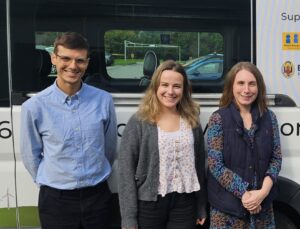Carbon-cutting transport schemes are set for a £29 million boost in Norfolk, despite the tough financial climate.
Norfolk County Council’s Cabinet will be considering a forward looking and carbon-cutting transport budget for the new financial year at a meeting on Monday 6 March.
At £133m the 2023/24 highways and transport budget represents a £29m increase on the previous year’s budget. Despite inflation being expected to dent the authority’s spending power the highway and transport team have been focusing on maintaining and improving the network and continuing strong investment in carbon cutting transport strategies as the council moves towards net zero carbon by 2030.
Cllr Graham Plant, Cabinet Member for Highways, Infrastructure and Transport, said: “We’re investing £29m more than last year in this forward-looking funding plan designed to ensure we have strong infrastructure for our growing economy and a network that supports people to travel easily for work, study and leisure.
“Cutting carbon continues to be a key focus for the highways and transport budget and we’ll be building on our journey towards net zero carbon through current and future schemes by spending millions to boost cycling and walking in towns across the county, delivering better public transport and putting more e-bikes and e-buses on our streets. Norfolk’s success in recent competitive bidding rounds and the subsequent funding awards by government have really boosted the amount of money we can spend on sustainable transport measures which will benefit bus users, pedestrians and cyclists across the whole county.”
The report that councillors will be considering summarises the three-year settlement following the Government’s 2022 autumn statement and the proposed allocations for 2023/24/25/26. It also includes the successful progression of the 3rd River Crossing in Great Yarmouth, the Transforming Cities Fund in the Greater Norwich area, and Long Stratton Bypass.
In recent years, competitive bids have already secured significant funding of £34.1m from the New Anglia Local Enterprise Partnership (NALEP), as well as the £38.1m from the Department for Transport’s Transforming Cities Fund (TCF) and Bus Service Improvement Funds (BSIP) of £49.6m for improvements, and £2.4m Active Travel funding for walking and cycling.
Members will also receive an update on the improvements being made possible through the additional £10m investment in highway maintenance which will see £2.4m spent in 2023/4 on a number of key routes in the county, including the A149 at King’s Lynn and Wells and the A1065 at Swaffham and Hilborough.
Details of the location and cost of 120 walking, cycling, and road improvements across the county, and how £45.6m will be spent on maintenance of bridges, roads, drains and paths, are available in the papers for the meeting.
Cabinet will consider the report when it meets at 10am on Monday, 6 March.
























